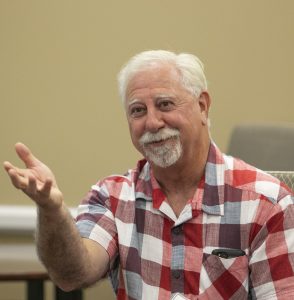 AI
AI
 AI
AI
 AI
AI
The University of Florida said today it’s teaming up with computer graphics chipmaker Nvidia Corp. to build what it says will be the world’s faster artificial intelligence supercomputer in academia.
The machine will be used to tackle a range of issues that can only be solved using AI, including research into COVID-19 and how to deal with challenges such as rising seas, aging populations, data security, personalized medicine, urban transportation and food insecurity. These are all pressing issues that affect residents of Florida in one way or another, UF said.
The university and Nvidia said the machine will deliver 700 petaflops of AI performance. A petaflop is a quadrillion floating-point operations per second, a common measure of supercomputing performance. “It’s a number-crunching beast,” UF alumnus and Nvidia founder Chris Malachowsky (pictured, below), said in a press briefing, adding that there will also be “uses and applications we haven’t thought of.”
To build the new machine, UF said it will beef up the capabilities of its existing HiPerGator supercomputer, which is based on Nvidia technology and was previously ranked among the world’s top 200 most powerful computers when it first went online in 2015.
To do so, Nvidia will provide UF with newer, more advanced hardware in the shape of its A100 Tensor Core high-performance graphics processing unit, which is based on the company’s modular DGX SuperPOD architecture and is specifically designed for AI and inference workloads. The plan is to integrate 14 new A100 DGX systems, which are powered by a combined 1,120 A100 GPUs, with HiPerGator in order to boost its existing capabilities.
Nvidia’s A100 DGX systems also provide specialized software for running workloads such as data analytics, AI training and inference acceleration, and recommendation systems that combine sound, vision, speech and contextual understanding of the environment to perform a range of tasks.
The new machine will pack 4 petabytes of high-performance storage and integrate with a Mellanox HDR 200Gb/s InfiniBand network for high throughput and extremely low-latency network connectivity, UF said.

Chris Malachowsky
The initiative is being made possible thanks to a $25 million donation from Malachowsky and an additional $25 million gift in hardware, software, training and services from Nvidia. In addition, UF will invest $20 million of its own money to create what it calls an “AI-centric supercomputing and data center.”
“We’ve created a replicable, powerful model of public-private cooperation for everyone’s benefit,” said Malachowsky, who now serves as an Nvidia Fellow.
UF has ambitions to become one of the leading AI universities in the U.S., and aims to create more than 30,000 “AI-enabled graduates” by 2030. Malachowsky reckons that UF’s location in Florida makes it ideally suited to do so, as the region is “a living laboratory for some of society’s most pressing issues,” he said.
Some of the issues include managing the effects of rising sea levels, which is a pressing concern in a state with more than 1,300 miles of coastline, Malachowsky said.
To fulfill those ambitious, UF plans to recruit 100 new faculty positions in AI and its related fields. It will also collaborate with a number of historically Black colleges and universities and Hispanic-serving institutions in order to promote wider accessibility to its supercomputer resources for every demographic. And it will establish a new Equitable AI program that aims to create new standards and certifications for developing AI tools that are cognizant of bias, unethical practices and legal and moral issues, it said.
UF Provost Joe Glover said in a briefing that the university is pushing a new concept of “AI across the curriculum,” adding that it’s “important to train the next generation of an AI-enabled workforce.”
Constellation Research Inc. analyst Holger Mueller told SiliconANGLE that universities like UF are key players in AI, both in areas of research and in education.
“It’s good to see Nvidia helping the Univeristy of Florida with this initiative,” Mueller said. “For the U.S. to play a key role in the AI era, it needs to train its knowledge workers in the discipline and most of them come from higher education institutions.”
Nvidia will continue to support UF’s concept through a range of initiatives. For example, the Nvidia Deep Learning Institute will collaborate with the university to help it design a new curriculum and coursework for students studying AI disciplines. It will also establish a new Nvidia AI Technology Center at the university, where UF graduates will work together with Nvidia’s experts to advance AI.
With reporting from Robert Hof
THANK YOU